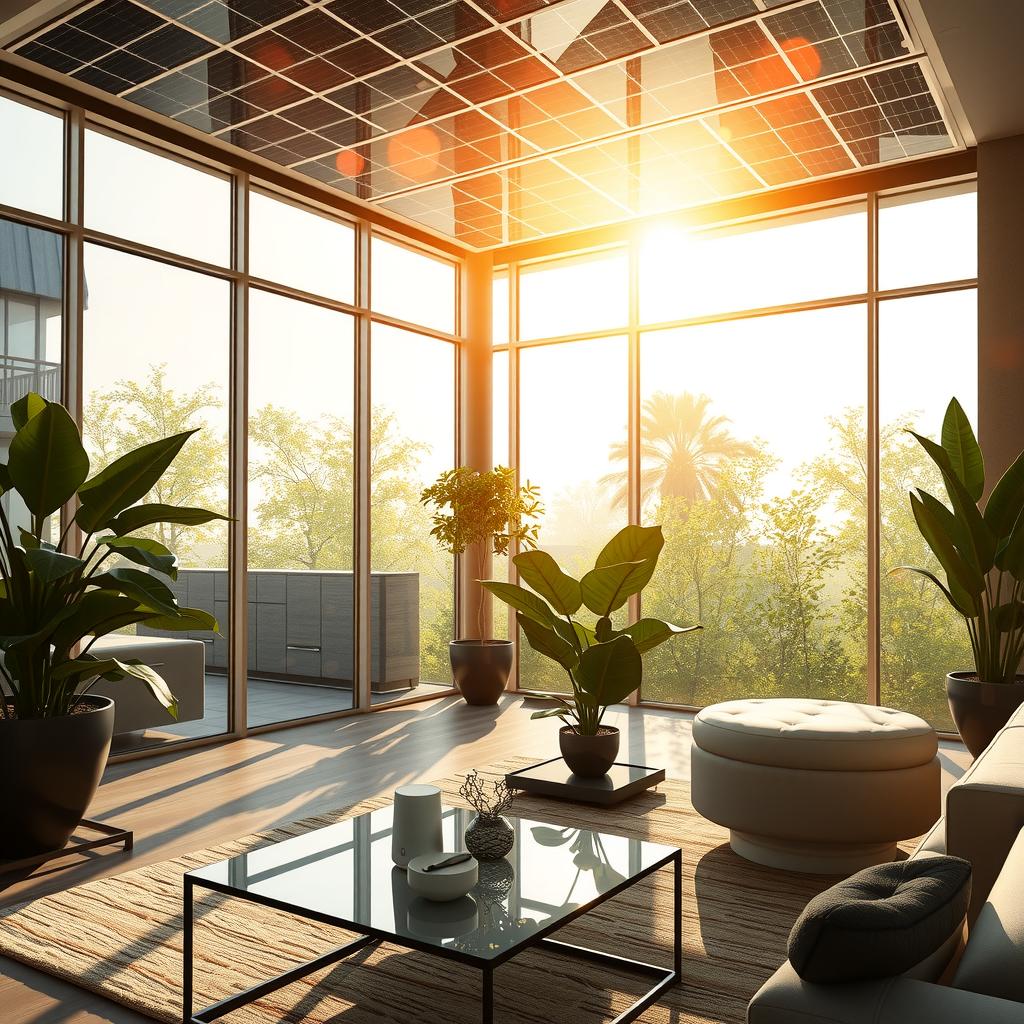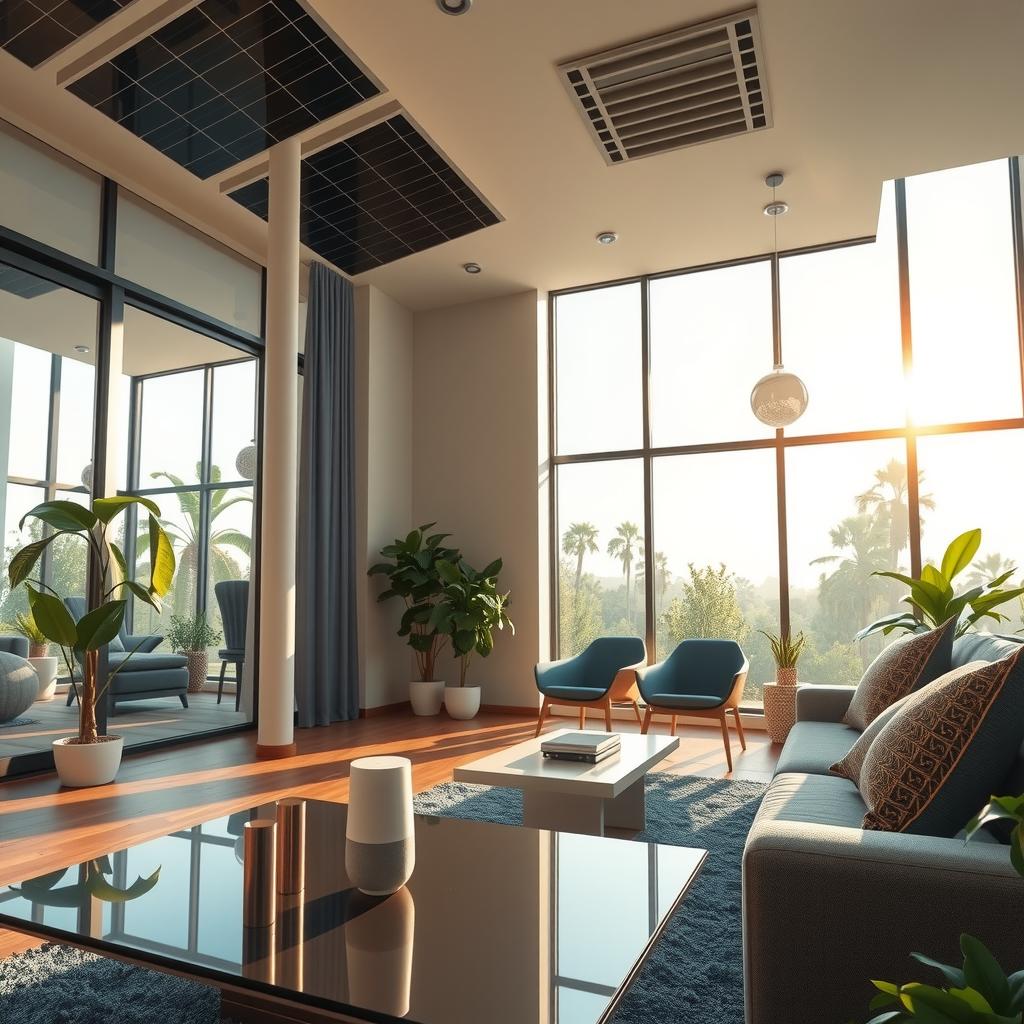As the world shifts towards a more sustainable future, many homeowners are grappling with a pivotal question: How can they seamlessly integrate renewable energy solutions into their everyday lives? With rising electricity costs and increasing environmental awareness, the integration of solar panels within smart home systems has emerged as an innovative solution. This powerful combination not only enhances energy efficiency but also promotes sustainable living through advanced home automation. By embracing this technology, households can optimize their energy consumption while enjoying the convenience and control that smart technology offers.
The core value of integrating solar panels with smart home systems lies in its ability to create a synergistic relationship between renewable energy production and intelligent management of household resources. Imagine controlling your home’s lighting, heating, or even charging your electric vehicle based on real-time solar generation data. Such capabilities drastically reduce reliance on grid power and lower utility bills—an appealing prospect for any homeowner looking to embrace both sustainability and financial savings.
This article will delve into how solar panel installations can work harmoniously with various smart home technologies to maximize efficiency and functionality. Readers will discover practical strategies for optimizing their homes through effective energy integration, which ultimately leads to enhanced comfort levels without sacrificing eco-consciousness. From understanding how solar-generated electricity powers connected devices during peak sunlight hours to utilizing storage solutions that capitalize on this clean energy source overnight—these insights provide compelling reasons for homeowners considering this dual approach.
By exploring these intersections of solar panels, energy efficiency, and smart technology, readers will find themselves equipped with actionable knowledge that encourages proactive steps toward greener living. As we traverse through this exploration together, it becomes clear that leveraging renewable sources like solar is not just about reducing carbon footprints; it’s about redefining what modern life looks like in alignment with our planet’s needs.
Thus begins the journey into the realm where innovative thinking meets practical application—a guide designed for those who aspire not only to live smarter but also more sustainably. Join us as we unpack the transformative potential of combining solar panel systems with cutting-edge home automation, paving the way towards an efficient future grounded in responsibility and resilience.

Key Points:
-
Optimized Energy Management: Leveraging Smart Technology with Solar Panels
The integration of solar panels with advanced smart home systems empowers homeowners to optimize their energy management. By utilizing real-time data on solar production, these systems can intelligently adjust the operation of appliances. For instance, during peak sunlight hours, a smart home may prioritize running energy-intensive devices like washing machines or charging electric vehicles, ensuring that the clean energy generated by solar panels is maximally utilized. -
Cost Savings Through Enhanced Efficiency: Understanding Consumption Patterns
One significant advantage of integrating solar panels with smart technology lies in the potential for substantial cost savings over time. Home automation solutions offer analytics that illuminate consumption patterns and encourage users to reduce reliance on traditional power sources. As homeowners gain insights into their energy usage through intuitive interfaces, they can make informed decisions that lead to improved energy efficiency, all while reaping the benefits from their investment in renewable energy technologies. -
Future-Ready Homes Embracing Sustainability: The Role of Smart Automation
As advancements continue in both renewable energies and smart home technologies, homes equipped with effective solar panel setups will become increasingly common. This evolution signifies a commitment to sustainable living as part of modern lifestyle demands. Home automation will play an essential role in this transformation, enabling seamless management and monitoring of energy use while reinforcing eco-friendly choices within communities striving for a greener future.

The Importance of Energy Integration in Modern Homes
Merging Solar Power with Smart Home Technology
In recent years, the shift towards renewable energy sources has become increasingly vital as the world grapples with climate change and depleting fossil fuel reserves. Among various alternatives, solar panels have emerged as a leading solution for harnessing clean energy. These devices not only provide homeowners with a sustainable power source but also offer significant cost savings over time. However, to maximize their potential, integration with smart home systems is essential. By utilizing solar panels alongside advanced smart technology, homeowners can create an efficient energy management system that optimizes consumption and enhances overall sustainability. This convergence allows for real-time monitoring of energy production and consumption patterns within the household, enabling users to make informed decisions about their energy usage. For instance, smart thermostats can adjust heating or cooling settings based on solar generation levels throughout the day—ensuring that electricity generated by solar panels is utilized efficiently rather than sent back to the grid unutilized.
Enhancing Energy Management Through Smart Home Systems
Leveraging Automation for Sustainable Living
The advancement of home automation technologies plays a pivotal role in enhancing energy efficiency when combined with solar panel systems. As households increasingly adopt smart devices—from intelligent lighting systems to automated appliances—the possibilities for optimizing renewable energy use expand dramatically. Homeowners can program these devices to operate during peak sunlight hours when solar panels are generating maximum power output; this strategic scheduling reduces reliance on traditional utility sources and minimizes carbon footprints significantly. Moreover, integrating battery storage solutions into this framework further enables homes to store excess solar-generated electricity for later use during non-sunny periods—such as at night or during cloudy days—enhancing overall resilience against fluctuating grid prices and instability.
The Future of Renewable Energy: A Seamless Connection
Building Communities Around Integrated Solutions
As more individuals embrace sustainable living through eco-friendly practices like installing solar panels, communities stand to benefit from collective efforts toward reducing dependence on non-renewable resources. The synergy between renewable energies such as solar power and innovative smart home solutions fosters an environment where neighborhoods prioritize green technologies over traditional approaches without sacrificing comfort or convenience. In this context, community-wide initiatives promoting shared resources—including community solar gardens linked via digital platforms—represent exciting opportunities for collaboration while maintaining individual agency through personal installations of solar panels. Looking forward, it becomes crucial that policymakers support infrastructure development aimed at facilitating these integrations so that future generations inherit not just cleaner air but smarter living spaces designed around holistic principles rooted firmly in sustainability.
Maximizing Efficiency through Smart Solutions
Optimizing Energy Consumption with Real-Time Monitoring
In the quest for energy efficiency, integrating smart home automation with renewable energy sources, particularly solar panels, plays a pivotal role. The advent of smart technology enables homeowners to monitor their energy consumption in real-time, allowing for informed decisions that lead to reduced waste and optimized usage. By utilizing sensors and smart devices, residents can gain insights into their daily habits and make adjustments accordingly. For example, a solar panel system not only generates clean energy but can also be linked to an intelligent home management system that tracks solar production versus household consumption. This integration ensures that homes maximize the use of green energy during peak sunlight hours while minimizing reliance on grid electricity when solar generation is low.
Moreover, automated systems come equipped with learning algorithms that adapt over time to user behavior patterns. This means they can suggest optimal settings tailored specifically for how occupants utilize electrical appliances throughout the day. For instance, if the data collected indicates high energy usage by certain appliances during non-peak hours, homeowners can program these devices to function at times when both solar output is high and electricity rates are lower—further enhancing overall energy integration and cost savings. Additionally, as more households embrace sustainable living practices enabled by technologies such as solar panels, there emerges a collective benefit where communities experience reduced demand on traditional power grids.
The significance of real-time monitoring cannot be overstated; it empowers users to identify inefficiencies quickly before they escalate into larger issues or unnecessary expenses. With mobile applications providing instant access to performance metrics from solar panel installations alongside other home automation features like programmable thermostats or smart lighting systems, individuals are better positioned than ever before not just to understand but also actively manage their consumption patterns in pursuit of sustainability goals.
Furthermore, this synergy between home automation and renewable resources fosters an environment conducive not only for individual financial savings but also contributes positively toward reducing carbon footprints collectively across neighborhoods or cities. As technology continues advancing within this sphere—enabling smarter solutions—the potential impact on global efforts against climate change becomes increasingly significant; thus highlighting why investment in such infrastructures is paramount for future generations seeking greener alternatives.
Ultimately, maximizing efficiency in modern residences goes beyond mere convenience—it represents a transformative shift towards responsible resource management fueled by innovation and ecological consideration driven primarily through effective utilization of tools like solar panels. By embracing these advancements in conjunction with strategic planning facilitated via smart technologies within homes today will undoubtedly pave pathways leading toward more resilient ecosystems tomorrow.
The Rise of Smart Homes in Sustainable Living
Exploring the integration of technology and renewable energy for eco-friendly lifestyles
The evolution of smart home technology is significantly transforming sustainable living, with emerging innovations paving the way for more efficient energy management systems. Central to this revolution is the solar panel, which allows homeowners to harness renewable energy directly from sunlight. This shift not only reduces reliance on fossil fuels but also markedly lowers electricity bills, contributing to a more financially viable lifestyle. As households increasingly adopt smart technology, they find that integration between devices enhances overall energy efficiency. For example, modern thermostats can learn user behavior and adjust heating and cooling accordingly while optimizing usage patterns based on real-time data provided by solar power generation.
Furthermore, advancements in home automation are streamlining daily tasks while promoting sustainability. Smart appliances equipped with sensors can communicate with each other to optimize their operation times around peak solar production periods—maximizing the effectiveness of solar panels installed on rooftops. By utilizing such innovative technologies, homes become self-sufficient ecosystems where renewable energies are effectively managed alongside traditional utilities. Energy storage solutions like batteries complement these setups by storing excess power generated during sunny days for use at night or during cloudy weather.
As consumers grow more conscious of their environmental impact, there is an increasing demand for products that promote sustainable living practices without sacrificing comfort or convenience. The synergy created through smart devices and solar panels not only empowers users to monitor their consumption patterns but also enables them to make informed decisions about when and how they use energy within their homes. Data analytics tools provide insights into usage trends that help families reduce wasteful habits—ultimately leading towards greener lifestyles.
Moreover, new developments in building materials further enhance sustainability efforts; eco-friendly constructions often include integrated designs specifically made for solar panels optimization while improving insulation properties simultaneously—creating a holistic approach toward reducing carbon footprints without compromising aesthetics or functionality within residential environments.
In essence, the future trajectory of sustainable living hinges upon continued innovation in both technology and its application within homes across various demographics—allowing communities worldwide to embrace an era marked by enhanced resourcefulness powered through clean energies like those derived from renewable resources such as solar power solutions combined seamlessly into everyday life routines via intelligent systems designed explicitly around enhancing human experiences while preserving nature’s balance efficiently too!
Frequently Asked Questions:
Q: How do solar panels work in a smart home environment?
A: In a smart home setting, solar panels work by generating electricity from sunlight, which can then be monitored and managed through smart technology. Homeowners can use automated systems to optimize energy consumption based on the real-time production of solar energy, ensuring that appliances operate when clean energy is most abundant.
Q: What are the cost benefits of integrating solar panels with smart home technology?
A: Integrating solar panels with smart home technology leads to significant cost savings over time. By using advanced sensors and automation features, homeowners can reduce reliance on grid power during peak hours and adjust their energy usage patterns. This not only cuts down utility bills but also maximizes the efficiency of renewable energy sources.
Q: Can I track my energy usage effectively if I install solar panels in my home?
A: Yes, installing solar panels alongside a smart home system allows for effective tracking of both generated and consumed energy. Home automation solutions provide intuitive interfaces where users can monitor their solar power generation against household consumption patterns, facilitating better decision-making around sustainable living practices.

Add a Comment